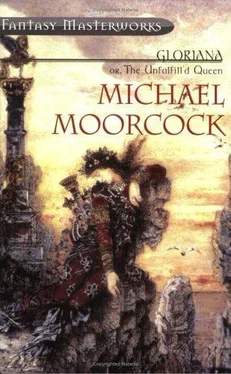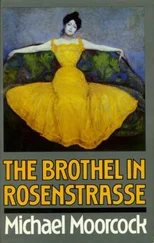Michael Moorcock - Gloriana
Здесь есть возможность читать онлайн «Michael Moorcock - Gloriana» весь текст электронной книги совершенно бесплатно (целиком полную версию без сокращений). В некоторых случаях можно слушать аудио, скачать через торрент в формате fb2 и присутствует краткое содержание. Жанр: Фэнтези, на английском языке. Описание произведения, (предисловие) а так же отзывы посетителей доступны на портале библиотеки ЛибКат.
- Название:Gloriana
- Автор:
- Жанр:
- Год:неизвестен
- ISBN:нет данных
- Рейтинг книги:5 / 5. Голосов: 1
-
Избранное:Добавить в избранное
- Отзывы:
-
Ваша оценка:
- 100
- 1
- 2
- 3
- 4
- 5
Gloriana: краткое содержание, описание и аннотация
Предлагаем к чтению аннотацию, описание, краткое содержание или предисловие (зависит от того, что написал сам автор книги «Gloriana»). Если вы не нашли необходимую информацию о книге — напишите в комментариях, мы постараемся отыскать её.
Gloriana — читать онлайн бесплатно полную книгу (весь текст) целиком
Ниже представлен текст книги, разбитый по страницам. Система сохранения места последней прочитанной страницы, позволяет с удобством читать онлайн бесплатно книгу «Gloriana», без необходимости каждый раз заново искать на чём Вы остановились. Поставьте закладку, и сможете в любой момент перейти на страницу, на которой закончили чтение.
Интервал:
Закладка:
Sir Tancred creaks a trifle as he turns. “You blame me-and yet it’s you, Lady Mary, who spurns my embrace.”
“I merely feared a spearing from your ornaments and suggested you remove your armour before you took me in your arms. I reject not you, Tancred, my dear, but your suit.”
“This armour is the badge of my calling. It is as much a part of me as my soul, for it displays the nature of my soul.”
Lady Mary (Tallow guesses her to be the youngest of the Perrott girls) moves across the floor and Tallow feels her warmth as she comes close to Sir Tancred. Tallow begins to lust for her, to scheme, a little hopelessly, for a means of making love to her. “Come back with me now, Tancred. The Old Year has passed, as I swore it would not, without a sharing of love between us. Let us, I beg you, begin the New Year in proper resolution.”
The zany groans and stirs. A little more vomit bubbles in his throat. He coughs, soiling his smock again. He takes a firmer hold on whatever it is that he grips in or upon his Isabella and begins to snore in a loud, somewhat self-satisfied tone, disturbing the lovers.
“My dear heart,” murmurs young Mary Perrott.
“Oh, indeed, my dear heart!” replies Tallow very quietly.
Mary tugs at Tancred’s hand.
Unable to resist an impulse, Tallow takes the arm of the zany and stretches it out towards the Champion’s foot, but delays Tancred’s iron ankle with his own hand so that the Champion is checked, kicking loose all too soon, seeing the innocent fingers of the zany there, and pausing to tuck them, with a fastidious metal toe, back beneath the table. Tallow has done all he feels he is able to do and watches sadly as the lovers depart, rustling and clattering, to Lady Mary’s rooms.
Glad to be free of the zany’s company, Tallow emerges from beneath the table, finds a cork, seals his bottle, and puts it in his belt, whistles softly for Tom, flings the cat accurately through the panel, stands tip-toe upon the bench which grazed his shin, reaches long fingers to grasp the ledge and hauls himself upward until he is in his hole again, replacing the panel as best he can, feeling the cold of the tunnels ahead and already regretting his haste in leaving the fire. He sighs and begins to wriggle forward. “Well, Tom, so it is New Year’s Eve we celebrate.” But Tom is racing ahead in pursuit of a rat and does not hear his master. As Tallow crawls behind the eager beast, he hears from beyond the panel a high, fluting wail.
Master Ernest Wheldrake has been in a corner of the hall all this time. He has seen Tallow come and go, he has overheard the lovers, but he has been too drunk to move. Now the poet rises, finds his quill where he dropped it an hour since, finds the notebook in which he had begun to write his verse, treads upon the fingers of the zany and, believing he has crushed some small rodent, tears at near-scarlet hair and wails again: “Oh, why is it that I must destroy so much?”
He leaves the hall, still seeking ink. It was for ink that he originally left his own apartments, a mile or more away, as he sat writing an accusatory sonnet to the wench who broke his heart that morning and whose name he cannot now recall. He stalks the lamp-lit corridors, a small flame-crested crane wading through shallow water, seeking fish, his arms stiffly at his sides, like starched wings, the quill behind his ear, the book in the large purse at his belt, his eyes on the floor, mumbling snatches of alliteration-“Sweet Sarah sate upon the starry step…Proud Pamela this poor ploughman’s heart hath pierced…A doom did Daphne declare that day…”-in an effort to recall the offending maid’s name. He takes a turn or two and discovers himself at an outer door. A tired man-at-arms greets him. He signs for the door to be opened.
“’Tis snowing, sir,” the guard declares kindly, hunching himself in his own furs, by way of emphasis. “Perhaps the coldest night of the winter, with the river threatening to freeze.”
Gravely Master Wheldrake signs again, piping: “Temperature is merely a state of mind. Anger and other passions shall warm me. I go down to the Town.”
The guard takes his cloak from his shoulders. It engulfs the tiny poet. “Wear this, sir, I beg you, or you’ll be a statue in the gardens by dawn.”
Wheldrake becomes sentimental. “You are a noble knave, a brave, bold, bragging bear of Albion, the best of Boudicca’s valiant breed, a warrior whose goodly deeds shall boast more fame than any limping line that Wheldrake pens. I thank thee, fellow, and bid thee fond farewell.” With which he flings himself through the door, into the dark and shivering night, into the snow, and plunges along a path which winds towards the few lights still burning in a London that largely sleeps. The guard wraps his arms around himself for a moment, watching the poet depart, then draws the door shut with a bang, regretting generosity which, he knows, will not be remembered when the morning comes, yet superstitiously glad to have performed a good deed so early in the year and thus almost certainly assuring himself of a little reciprocal luck.
Master Wheldrake’s own luck pulls him, oblivious, through two snowbanks, across a frozen pool, through a gate in the wall, into the outer lanes of the town, where the snow has not settled so thickly. He takes a familiar road, by instinct rather than judgement, which brings him at last to the shuttered walls of a large ramshackle building which sports a bush on a pole above its main arch and a sign on the door proclaiming itself the Seahorse Tavern. Lights behind the shutters, noise behind the doors, tell Master Wheldrake that this, one of his favourite drinking places and a notoriously unwholesome den, will give him the welcome he most desires, provide the comforts his blood demands, and he knocks, is admitted, passes through the courtyard with its ranks of galleries in the darkness above, enters the public room and sinks into the stink and din of coarse laughter, vulgar jesting and bad wine, for it is amongst ruffians like these, amongst whores, amongst the resentful, cynical, ill-natured and desperate men and women who inhabit this riverside rats’ nest, that the wounded poet can most easily find release from all that burdens him. He lets the guard’s fur fall, cries for wine and, when he produces gold, is given it. The familiar whores come up to him, scratching at his neck, threatening him with all the delights he craves; he grins, he bows, he drinks; he greets those he recognises and those he does not recognise with equal good humour, encouraging their mockery, their contempt, giggling at every insult, screaming delightedly at every pinch and shove, watched by the quiet, cruel eye of a man who sits in a gallery above, sharing a bottle with a burnoosed, bearded and beringed Saracen who is a little disturbed by the crowd’s treatment of Wheldrake.
The Saracen leans towards his companion. “They mean that gentleman harm, I think.”
The other, whose face is largely hidden by heavy black locks and by the brim of an outlandish sombrero which sports the tattered feathers of a crow, whose body is wrapped in a black, stained seacloak, shakes his head. “They perform for him, sir, I assure you. It is how they earn his gold. He’s Wheldrake, from the palace. A protege of the Queen’s, son of some noble Sunderland family, Lady Lyst’s lover. He spends much of his time in taverns like this one and always has, since he was at Cambridge’s University.”
“You’ve known him so long?”
“Aye, but he has never known me.”
“Oh, Captain Quire!” The Saracen laughs. He is drunk, for he is not used to wine. He is a handsome young merchant, a minor lord in Arabia, that most ambitious of all lands under the Queen’s protection. Doubtless he is flattered by the fact that Captain Arturus Quire has befriended him; Quire knows the whole of London, knows how best to find the most enjoyment in the city. The Moor half-suspects Captain Quire to have an eye on his purse, but he carries only a moderate amount of money, to which the captain is welcome, for the pleasure he has so far provided. The Moor frowns. “ Would you be bent on robbing me, Quire?”
Читать дальшеИнтервал:
Закладка:
Похожие книги на «Gloriana»
Представляем Вашему вниманию похожие книги на «Gloriana» списком для выбора. Мы отобрали схожую по названию и смыслу литературу в надежде предоставить читателям больше вариантов отыскать новые, интересные, ещё непрочитанные произведения.
Обсуждение, отзывы о книге «Gloriana» и просто собственные мнения читателей. Оставьте ваши комментарии, напишите, что Вы думаете о произведении, его смысле или главных героях. Укажите что конкретно понравилось, а что нет, и почему Вы так считаете.






